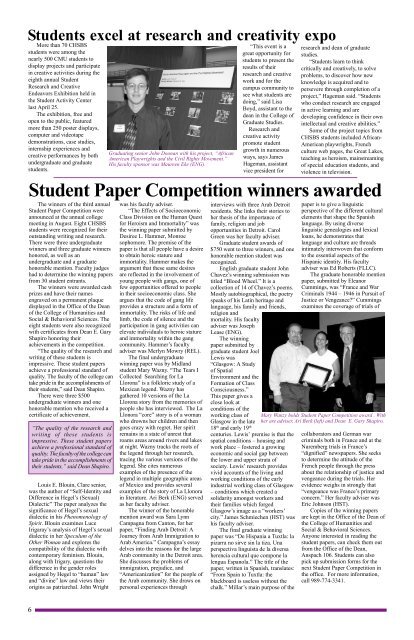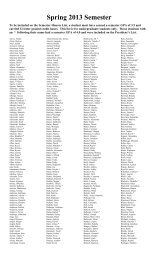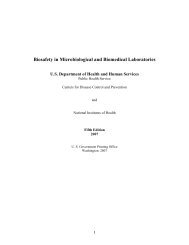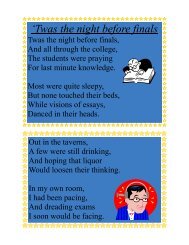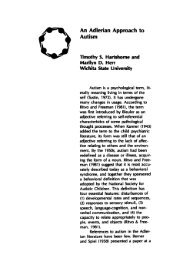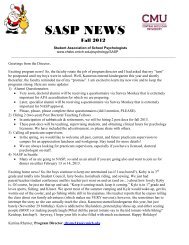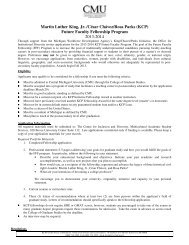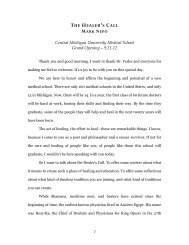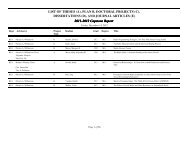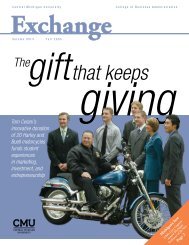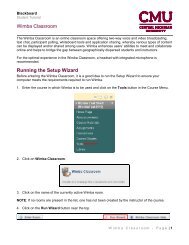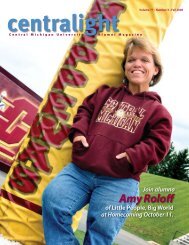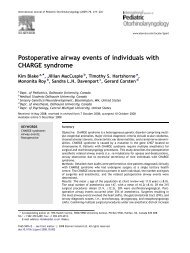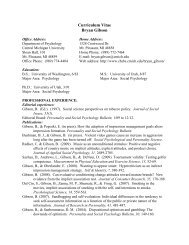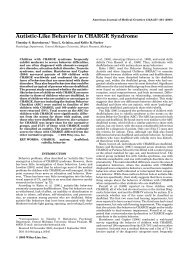Fall 2001 - Central Michigan University
Fall 2001 - Central Michigan University
Fall 2001 - Central Michigan University
- TAGS
- michigan
- www.cmich.edu
Create successful ePaper yourself
Turn your PDF publications into a flip-book with our unique Google optimized e-Paper software.
Students excel at research and creativity expo<br />
More than 70 CHSBS<br />
students were among the<br />
nearly 500 CMU students to<br />
display projects and participate<br />
in creative activities during the<br />
eighth annual Student<br />
Research and Creative<br />
Endeavors Exhibition held in<br />
the Student Activity Center<br />
last April 25.<br />
The exhibition, free and<br />
open to the public, featured<br />
more than 250 poster displays,<br />
computer and videotape<br />
demonstrations, case studies,<br />
internship experiences and<br />
creative performances by both<br />
undergraduate and graduate<br />
students.<br />
Student Paper Competition winners awarded<br />
The winners of the third annual<br />
Student Paper Competition were<br />
announced at the annual college<br />
meeting in August. Eight CHSBS<br />
students were recognized for their<br />
outstanding writing and research.<br />
There were three undergraduate<br />
winners and three graduate winners<br />
honored, as well as an<br />
undergraduate and a graduate<br />
honorable mention. Faculty judges<br />
had to determine the winning papers<br />
from 30 student entrants.<br />
The winners were awarded cash<br />
prizes and have their names<br />
engraved on a permanent plaque<br />
displayed in the Office of the Dean<br />
of the College of Humanities and<br />
Social & Behavioral Sciences. The<br />
eight students were also recognized<br />
with certificates from Dean E. Gary<br />
Shapiro honoring their<br />
achievements in the competition.<br />
“The quality of the research and<br />
writing of these students is<br />
impressive. These student papers<br />
achieve a professional standard of<br />
quality. The faculty of the college can<br />
take pride in the accomplishments of<br />
their students,” said Dean Shapiro.<br />
There were three $500<br />
undergraduate winners and one<br />
honorable mention who received a<br />
certificate of achievement.<br />
Louis E. Blouin, Clare senior,<br />
was the author of “Self-Identity and<br />
Difference in Hegel’s (Sexual)<br />
Dialectic” The paper analyzes the<br />
significance of Hegel’s sexual<br />
dialectic in his Phenomenology of<br />
Spirit. Blouin examines Luce<br />
Irigaray’s analysis of Hegel’s sexual<br />
dialectic in her Speculum of the<br />
Other Woman and explores the<br />
compatibility of the dialectic with<br />
contemporary feminism. Blouin,<br />
along with Irigary, questions the<br />
difference in the gender roles<br />
assigned by Hegel to “human” law<br />
and “divine” law and views their<br />
origins as patriarchal. John Wright<br />
6<br />
“The quality of the research and<br />
writing of these students is<br />
impressive. These student papers<br />
achieve a professional standard of<br />
quality. The faculty of the college can<br />
take pride in the accomplishments of<br />
their students,” said Dean Shapiro.<br />
Graduating senior John Doonan with his project, “African<br />
American Playwrights and the Civil Rights Movement.”<br />
His faculty sponsor was Maureen Eke (ENG).<br />
was his faculty adviser.<br />
“The Effects of Socioeconomic<br />
Class Division on the Human Quest<br />
for Heroism and Immortality” was<br />
the winning paper submitted by<br />
Desiree L. Hammer, Monroe<br />
sophomore. The premise of the<br />
paper is that all people have a desire<br />
to obtain heroic stature and<br />
immortality. Hammer makes the<br />
argument that these same desires<br />
are reflected in the involvement of<br />
young people with gangs, one of<br />
few opportunities offered to people<br />
in their socioeconomic class. She<br />
argues that the code of gang life<br />
provides a structure and a form of<br />
immortality. The risks of life and<br />
limb, the code of silence and the<br />
participation in gang activities can<br />
elevate individuals to heroic stature<br />
and immortality within the gang<br />
community. Hammer’s faculty<br />
adviser was Merlyn Mowry (REL).<br />
The final undergraduate<br />
winning paper was by Midland<br />
student Mary Wazny. “The Tears I<br />
Collected Searching for La<br />
Llorona” is a folkloric study of a<br />
Mexican legend. Wazny has<br />
gathered 10 versions of the La<br />
Llorona story from the memories of<br />
people she has interviewed. The La<br />
Llonora “core” story is of a woman<br />
who drowns her children and then<br />
goes crazy with regret. Her spirit<br />
remains in a state of unrest that<br />
roams areas around rivers and lakes<br />
at night. Wazny tracks the roots of<br />
the legend through her research,<br />
tracing the various versions of the<br />
legend. She cites numerous<br />
examples of the presence of the<br />
legend in multiple geographic areas<br />
of Mexico and provides several<br />
examples of the story of La Llonora<br />
in literature. Ari Berk (ENG) served<br />
as her faculty adviser.<br />
The winner of the honorable<br />
mention award was Sara Lynn<br />
Campagna from Canton, for her<br />
paper, “Finding Arab Detroit: A<br />
Journey from Arab Immigration to<br />
Arab America.” Campagna’s essay<br />
delves into the reasons for the large<br />
Arab community in the Detroit area.<br />
She discusses the problems of<br />
immigration, prejudice, and<br />
“Americanization” for the people of<br />
the Arab community. She draws on<br />
personal experiences through<br />
“This event is a<br />
great opportunity for<br />
students to present the<br />
results of their<br />
research and creative<br />
work and for the<br />
campus community to<br />
see what students are<br />
doing,” said Lisa<br />
Boyd, assistant to the<br />
dean in the College of<br />
Graduate Studies.<br />
Research and<br />
creative activity<br />
promote student<br />
growth in numerous<br />
ways, says James<br />
Hageman, assistant<br />
vice president for<br />
interviews with three Arab Detroit<br />
residents. She links their stories to<br />
her thesis of the importance of<br />
family, religion and job<br />
opportunities in Detroit. Carol<br />
Green was her faculty adviser.<br />
Graduate student awards of<br />
$750 went to three winners, and one<br />
honorable mention student was<br />
recognized.<br />
English graduate student John<br />
Chavez’s winning submission was<br />
titled “Blood Wheel.” It is a<br />
collection of 14 of Chavez’s poems.<br />
Mostly autobiographical, the poetry<br />
speaks of his Latin heritage and<br />
language, his family and friends,<br />
religion and<br />
mortality. His faculty<br />
adviser was Joseph<br />
Lease (ENG).<br />
The winning<br />
paper submitted by<br />
graduate student Joel<br />
Lewis was<br />
“Glasgow: A Study<br />
of Spatial<br />
Environment and the<br />
Formation of Class<br />
Consciousness.”<br />
This paper gives a<br />
close look at<br />
conditions of the<br />
working class of<br />
Glasgow in the late<br />
18 th and early 19 th<br />
centuries. Lewis’ premise is that the<br />
spatial conditions – housing and<br />
work place – fostered a growing<br />
economic and social gap between<br />
the lower and upper strata of<br />
society. Lewis’ research provides<br />
vivid accounts of the living and<br />
working conditions of the early<br />
industrial working class of Glasgow<br />
– conditions which created a<br />
solidarity amongst workers and<br />
their families which forged<br />
Glasgow’s image as a “workers’<br />
city.” James Schmiechen (HST) was<br />
his faculty adviser.<br />
The final graduate winning<br />
paper was “De Hispania a Tuxtla: la<br />
pizarra no sirve sin la tiza. Una<br />
perspectiva linguista de la diversa<br />
herencia cultural que compone la<br />
lengua Espanola.” The title of the<br />
paper, written in Spanish, translates:<br />
“From Spain to Tuxtla: the<br />
blackboard is useless without the<br />
chalk.” Millar’s main purpose of the<br />
research and dean of graduate<br />
studies.<br />
“Students learn to think<br />
critically and creatively, to solve<br />
problems, to discover how new<br />
knowledge is acquired and to<br />
persevere through completion of a<br />
project,” Hageman said. “Students<br />
who conduct research are engaged<br />
in active learning and are<br />
developing confidence in their own<br />
intellectual and creative abilities.”<br />
Some of the project topics from<br />
CHSBS students included African-<br />
American playwrights, French<br />
culture web pages, the Great Lakes,<br />
teaching as heroism, mainstreaming<br />
of special education students, and<br />
violence in television.<br />
paper is to give a linguistic<br />
perspective of the different cultural<br />
elements that shape the Spanish<br />
language. By using diverse<br />
linguistic genealogies and lexical<br />
loans, he demonstrates that<br />
language and culture are threads<br />
intimately interwoven that conform<br />
to the essential aspects of the<br />
Hispanic identity. His faculty<br />
adviser was Ed Roberts (FLLC).<br />
The graduate honorable mention<br />
paper, submitted by Eleanor<br />
Cummings, was “France and War<br />
Criminals 1944 – 1946 in Pursuit of<br />
Justice or Vengeance?” Cummings<br />
examines the coverage of trials of<br />
Mary Wanzy holds Student Paper Competition award . With<br />
her are adviser, Ari Berk (left) and Dean E. Gary Shapiro.<br />
collaborators and German war<br />
criminals both in France and at the<br />
Nuremberg trials in France’s<br />
“dignified” newspapers. She seeks<br />
to determine the attitude of the<br />
French people through the press<br />
about the relationship of justice and<br />
vengeance during the trials. Her<br />
evidence weighs in strongly that<br />
“vengeance was France’s primary<br />
concern.” Her faculty adviser was<br />
Eric Johnson (HST).<br />
Copies of the winning papers<br />
are kept in the Office of the Dean of<br />
the College of Humanities and<br />
Social & Behavioral Sciences.<br />
Anyone interested in reading the<br />
student papers, can check them out<br />
from the Office of the Dean,<br />
Anspach 106. Students can also<br />
pick up submission forms for the<br />
next Student Paper Competition in<br />
the office. For more information,<br />
call 989-774-3341.


